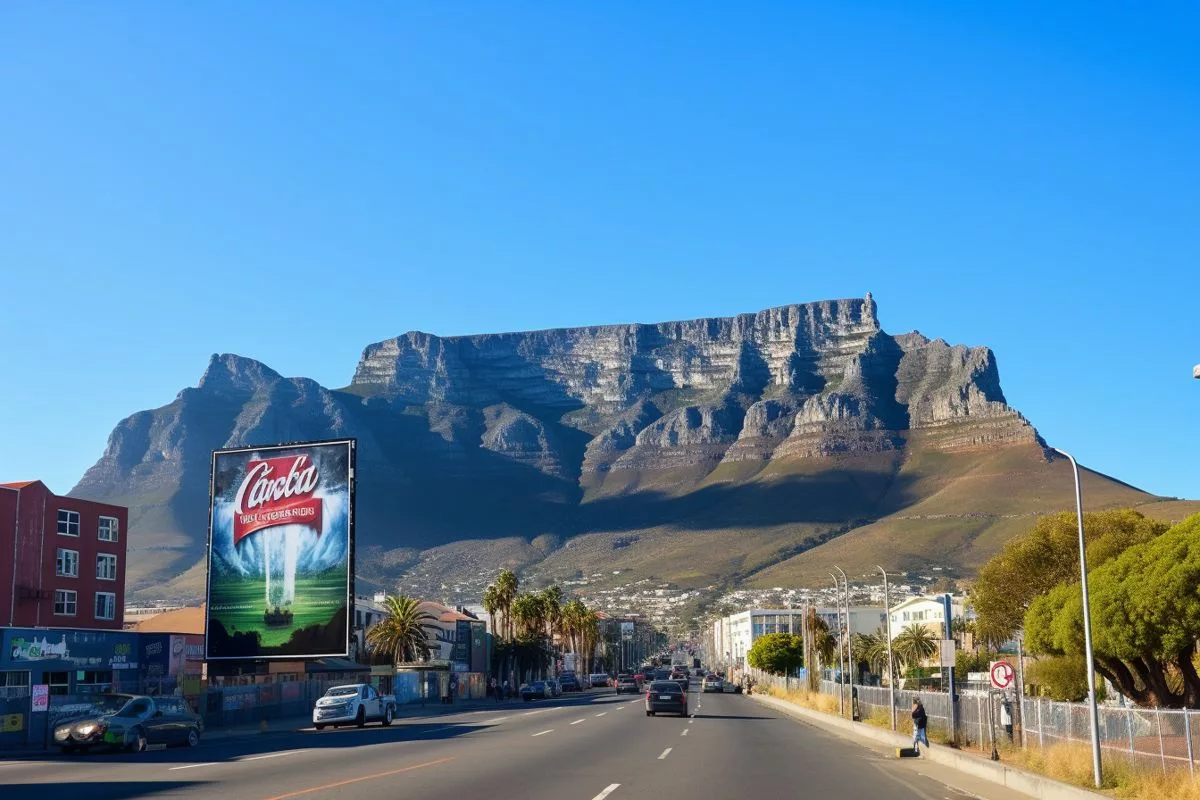Cape Town has introduced a new Outdoor Advertising By-law that balances economic growth with preserving the city’s unique assets. The by-law takes into consideration the individual characteristics of each area and guides the location and style of outdoor advertising, respecting the distinctiveness of each area and encouraging business-friendly practices. The by-law addresses concerns of safety and traffic flow and includes luminance guidelines and area-specific control. The by-law was developed through a comprehensive collaboration process with stakeholders and the public.
What is Cape Town’s new Outdoor Advertising By-law?
Cape Town’s new Outdoor Advertising By-law is a regulatory measure for outdoor advertising and signage that introduces a novel methodology for striking a balance between economic expansion and the preservation of the city’s unique visual, tourist, environmental, and heritage assets. It has been carefully crafted with an emphasis on maintaining the unique charm of the city, taking into consideration the individual characteristics of each area, and accordingly guiding the location and style of outdoor advertising. The by-law respects the distinctiveness of each area, encourages business-friendly practices, and addresses concerns of safety and traffic flow.
The city of Cape Town ushers in a new age of creativity and economic promise in the realm of outdoor advertising. A newly passed Outdoor Advertising By-law, ratified by the city council at the closing meeting of 2023, takes the place of the outdated by-law from 2001.
This new regulatory measure for outdoor advertising and signage introduces a novel methodology for striking a balance between economic expansion and the preservation of the city’s unique visual, tourist, environmental, and heritage assets. It has been carefully crafted with an emphasis on maintaining the unique charm of the city, taking into consideration the individual characteristics of each area, and accordingly guiding the location and style of outdoor advertising.
Respecting Area Uniqueness and Encouraging Business Friendly Practices
Alderman Eddie Andrews, the Deputy Mayor and Mayoral Committee Member for Spatial Planning and Environment, insightfully delineated the goals of the by-law. He stressed the paramount importance of respecting the distinctiveness of each area, remarking, “What may be suitable for one area, might not be for another.” Alderman Andrews further illuminated the by-law’s objective to bolster business-friendly attitudes, minimize bureaucratic hurdles, and support a diversity of signs that do not necessitate prior application for installation.
The reformed By-law is all-encompassing, acknowledging emerging trends and instituting specific regulations for digital and electronic screens. It brings more clarity to ambiguous terminologies and broadens the scope for immediate approvals of advertising signs. Furthermore, it covers a wide range of outdoor advertising types, including billboards, standalone signs, window signs, signs on verandas, balconies, fences, and many more.
Luminance Guidelines and Area-Specific Control
In recognition of the global trend of integrating digital and electronic screens in outdoor advertising, the new Cape Town By-law includes luminance guidelines. These empower the city to regulate the lighting of signs, brightness, and the effect they have on their surroundings, all while preserving the splendor of the iconic Table Mountain.
The By-law also incorporates a control system to regulate the type of outdoor advertising allowed in specific areas. Locations under maximum control include nature reserves, beaches, seashores, scenic drives, and heritage sites. Partial control is applied over central business districts and mixed-use commercial and residential areas, whereas minimum control is allocated to industrial zones, designated transportation terminals, and railway stations, among others.
Safety, Traffic Flow, and The By-law’s Incubation
Significantly, the By-law also addresses vital concerns of safety and traffic flow. The regulations ensure that outdoor advertising and signs do not pose a risk to vehicular or pedestrian safety or negatively influence the local character regarding appearance, size, or brightness.
The initiation of the new By-law is the result of an exhaustive, four-year-long review process. It was kickstarted in 2019 with an ambition to modernize the by-law from two decades ago and harmonize it with recent advancements like digital and electronic signs. The overhaul also aimed to enhance regulatory compliance and enforcement, streamline approval procedures, and assist non-profit organizations.
Collaboration and Public Participation in The Review Process
The review process saw active participation from a variety of stakeholders, including ratepayers, billboard companies, the events industry, and the Western Cape Government. It also saw an overwhelming response from the public, with over 1,000 unique comments during the public participation process held in June and August 2021.
A more relaxed approach to billboard regulation, extended approval times, and heightened control in residential areas were among the shared sentiments that surfaced during the review. Key principles such as safety taking precedence over advertising, adherence to national practice, and a balanced consideration of economic opportunities and the impact of outdoor signs on local communities were of utmost importance during the review.
Alderman Andrews conveyed his gratitude to everyone who contributed to this extensive process, celebrating the new By-law as a testament to comprehensive collaboration. The Outdoor Advertising By-law is not merely a set of regulations but a well-structured plan that respects Cape Town’s unique heritage and safeguards its residents from the potential impacts of signage, particularly electronic and digital. As Alderman Andrews noted, the city can take pride in this By-law, which will serve as a guiding light in the years ahead.
What is the goal of Cape Town’s new Outdoor Advertising By-law?
The goal of Cape Town’s new Outdoor Advertising By-law is to strike a balance between economic growth and the preservation of the city’s unique visual, tourist, environmental, and heritage assets. The by-law takes into consideration the individual characteristics of each area and guides the location and style of outdoor advertising, respecting the distinctiveness of each area and encouraging business-friendly practices. The by-law addresses concerns of safety and traffic flow and includes luminance guidelines and area-specific control.
How does Cape Town’s new Outdoor Advertising By-law respect the uniqueness of each area?
Cape Town’s new Outdoor Advertising By-law respects the uniqueness of each area by taking into consideration the individual characteristics of each area and accordingly guiding the location and style of outdoor advertising. The by-law encourages business-friendly practices, minimizes bureaucratic hurdles, and supports a diversity of signs that do not necessitate prior application for installation. The by-law also incorporates a control system to regulate the type of outdoor advertising allowed in specific areas.
What types of outdoor advertising are covered by Cape Town’s new Outdoor Advertising By-law?
Cape Town’s new Outdoor Advertising By-law covers a wide range of outdoor advertising types, including billboards, standalone signs, window signs, signs on verandas, balconies, fences, and many more. The by-law acknowledges emerging trends and instituting specific regulations for digital and electronic screens.
What are the luminance guidelines in Cape Town’s new Outdoor Advertising By-law?
Cape Town’s new Outdoor Advertising By-law includes luminance guidelines to regulate the lighting of signs, brightness, and the effect they have on their surroundings, all while preserving the splendor of the iconic Table Mountain. The luminance guidelines empower the city to regulate the lighting of signs.
How does Cape Town’s new Outdoor Advertising By-law address concerns of safety and traffic flow?
Cape Town’s new Outdoor Advertising By-law addresses concerns of safety and traffic flow by ensuring that outdoor advertising and signs do not pose a risk to vehicular or pedestrian safety or negatively influence the local character regarding appearance, size, or brightness.
What was the review process for Cape Town’s new Outdoor Advertising By-law?
The review process for Cape Town’s new Outdoor Advertising By-law was four-year-long and saw active participation from a variety of stakeholders, including ratepayers, billboard companies, the events industry, and the Western Cape Government. The review process also saw an overwhelming response from the public, with over 1,000 unique comments during the public participation process held in June and August 2021. The review process aimed to modernize the by-law from two decades ago and harmonize it with recent advancements like digital and electronic signs.









